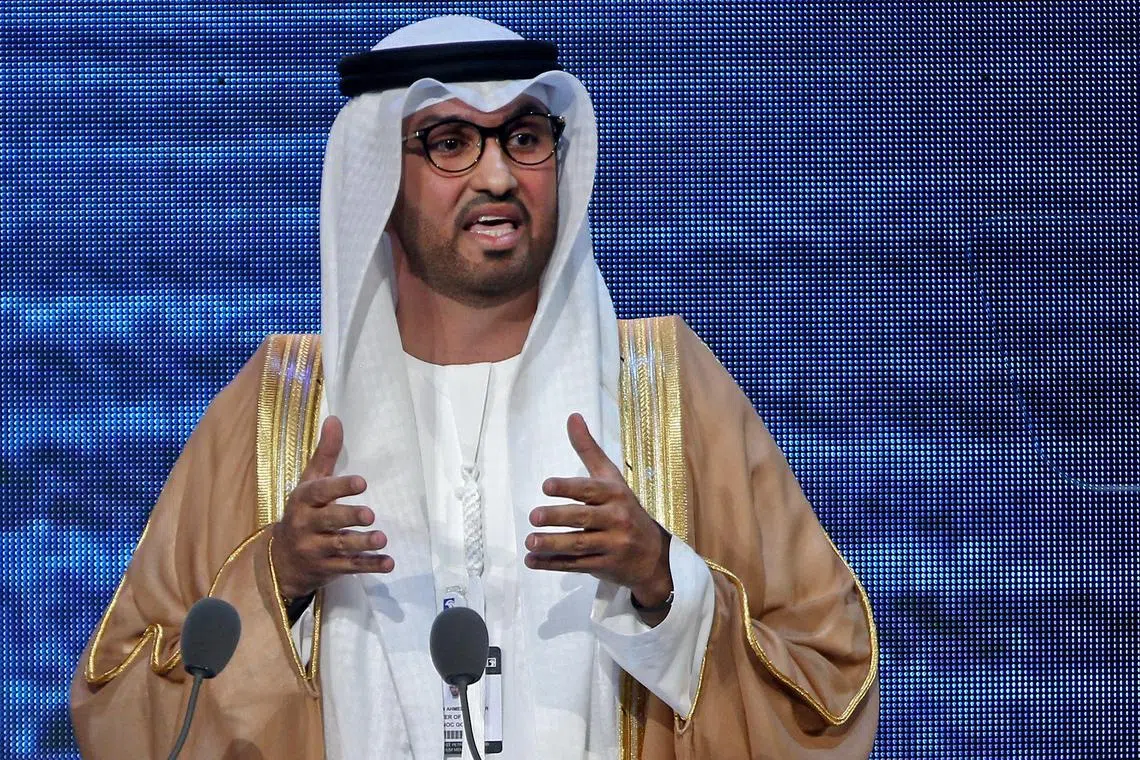Choice of oil boss to lead UN climate talks draws mixed reactions
Sign up now: Get ST's newsletters delivered to your inbox

As COP28 president, Dr Sultan Ahmed Al Jaber will help shape the agenda of the Nov 30 to Dec 12 conference in Dubai.
PHOTO: AFP
SINGAPORE - The United Arab Emirates’ announcement on Thursday that the head of its state oil giant Abu Dhabi National Oil Company (ADNOC) would lead this year’s COP28 climate conference
As president of COP28, Dr Sultan Ahmed Al Jaber, who is also the UAE’s minister of industry and technology and its climate envoy, will help shape the agenda of the Nov 30 to Dec 12 conference to be held in Dubai.
His is a key role to build consensus to reach an ambitious climate deal.
The United Nations says the world needs to take urgent, collective steps to tackle rising greenhouse gas emissions – mainly from burning fossil fuels – as global temperatures keep rising and impacts worsen.
That puts enormous pressure on nations hosting annual UN climate talks to push for tougher action on emissions, boost climate finance to drive the green transition, and help poorer nations cope with impacts such as floods, storms and rising sea levels.
“The science is extremely clear. We are losing the battle to prevent the worst impacts of the climate crisis,” UN spokesman Stephane Dujarric told reporters in New York on Thursday. “The Secretary-General reaffirms that there is no way to avoid such a climate catastrophe without ending our addiction to fossil fuels.”
The UAE is a major Opec exporter as well as a supporter of both renewable energy investment and continued oil and gas production. But climate activists say this dual focus is incompatible with the goal of deep emission cuts needed this decade to avoid the world busting the 1.5 deg C warming limit
In a statement on his appointment on Thursday, Dr Al Jaber said: “The UAE is approaching COP28 with a strong sense of responsibility and the highest possible level of ambition.” He said the UAE will bring “a pragmatic, realistic and solutions-oriented approach that delivers transformative progress for climate and for low carbon economic growth”.
Last year’s COP27 climate talks in Egypt were heavily criticised for a lack of ambition on cutting emissions from fossil fuels. The final text made no mention of phasing out fossil fuels, despite dozens of nations supporting stronger wording. That has put pressure on the UAE to send a strong signal on fossil fuels.
Reactions to the appointment of Dr Al Jaber were swift in condemnation and cautious support.
Former British prime minister Tony Blair, executive chairman of the Tony Blair Institute for Global Change, pointed to the UAE’s role as bridge-builder between rich and poor nations, saying: “The country is an exemplar of the public and private sectors working in partnership. It has strong relationships with the Global North and South, East and West, and can be the honest broker needed to raise ambitions and seek real consensus.”
He also noted the UAE has shown leadership in climate investment and innovation, including becoming one of the largest investors in renewables at home and abroad.
Dr Al Jaber was founding chief executive of Abu Dhabi’s renewable energy firm Masdar, and is driving ADNOC’s low-carbon growth strategy. But he has also been open about the need to step up global investment in oil and gas as part of what he says is a realistic transition to meet the world’s energy needs as green technology investment gathers speed.
Dr Maria Mendiluce, chief executive of the We Mean Business Coalition, said driving investment in the green economy will be key at COP28. “Business needs the COP28 presidency to mobilise ambitious government policy and finance to dramatically scale up investments in clean energy, while stopping new investment in fossil fuels. This will enable companies to cut emissions at speed and build a safer, more stable and thriving global economy.”
But climate activists said the appointment sent the wrong signal and risked COP28 becoming a greenwashing event that would back more investment in oil and gas.
“This is a truly breathtaking conflict of interest and is tantamount to putting the head of a tobacco company in charge of negotiating an anti-smoking treaty,” said Mr Romain Ioualalen, global policy manager at Oil Change International.
“This appointment risks further undermining the credibility of global climate talks,” he added.
ActionAid said fossil fuel interests had captured the UN climate talks process.
“The UN Climate Summit is supposed to be a space where the world holds polluters to account,” said Ms Teresa Anderson, global lead of climate justice at ActionAid, in a statement.
“Like last year’s summit, we’re increasingly seeing fossil fuel interests taking control of the process and shaping it to meet their own needs,” she added.



